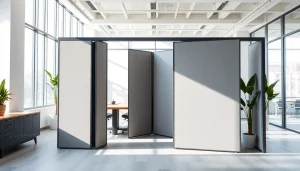Understanding Furniture Hardware Suppliers
The furniture industry relies heavily on quality components to create functional and aesthetically pleasing products. Furniture hardware suppliers play a fundamental role in this ecosystem, providing the essential elements that contribute to furniture durability, functionality, and design appeal. As a cornerstone of the manufacturing process, selecting the right furniture hardware suppliers can substantially impact the overall quality of the finished piece.
What Defines Quality Furniture Hardware?
Quality furniture hardware can be defined by several critical attributes. First, durability is paramount; hardware such as hinges, drawer slides, and knobs must withstand daily use without failing. Materials used often determine durability; high-quality metals like stainless steel or solid brass offer better longevity compared to cheaper alternatives.
Secondly, functionality is a critical factor. For instance, soft-close drawer slides that eliminate slamming help enhance user experience significantly. Lastly, aesthetic features such as design and finish can elevate the overall look of the furniture, enabling it to meet customer preferences and style trends.
The Role of Suppliers in the Furniture Industry
Suppliers serve as the link between manufacturers and the materials required to produce furniture products. They offer not only hardware but also solutions in logistics and inventory management. A reliable supplier ensures that manufacturers can maintain their production schedules by consistently delivering quality products. Furthermore, they can provide technical assistance, ensuring manufacturers make the right choices in hardware selection based on the requirements of specific projects.
Key Trends in Furniture Hardware Supply
The furniture hardware industry is constantly evolving, shaped by trends in technology, design, and consumer preferences. One of the most significant trends is the increasing demand for eco-friendly materials. More buyers prefer sustainable solutions, prompting suppliers to source hardware made from recycled or sustainably obtained materials.
Additionally, technological integration in hardware such as smart locks and automation features is growing. Manufacturers are looking at suppliers who can provide innovative solutions that incorporate modern expectations into their products.
Types of Furniture Hardware Available
Cabinet and Drawer Hardware Options
Cabinet and drawer hardware includes essential components like knobs, pulls, hinges, and slides. These items are fundamental in determining both function and design within any piece of furniture. Quality cabinet hardware is essential in applications ranging from kitchen cabinets to office desks.
For instance, the choice of drawer slides—be it metal, plastic, or ball-bearing—can determine how smoothly a drawer opens and closes. Moreover, decorative knobs and pulls not only serve a functional purpose but also enhance the aesthetic of the furniture piece.
Specialty Hardware for Custom Projects
Custom furniture projects often require specialized hardware solutions that can meet unique functional needs. Specialty suppliers offer an array of customizable options, including specialty hinges for cabinets, unique brackets for tables, and slide systems for pull-out shelves. These components allow furniture designers to push the boundaries of innovation while maintaining the quality and reliability of the finished products.
Innovative Materials and Designs in Furniture Hardware
Today’s market features an increasing variety of innovative materials and designs in furniture hardware. Suppliers are now offering hardware made from advanced composites, sustainable woods, and synthetic materials that offer improved resilience and aesthetic appeal. For example, ceramic knobs and pulls are gaining popularity due to their unique designs and finishes.
Additionally, the trend toward minimalism has influenced hardware design, encouraging manufacturers to offer sleek, unobtrusive options that complement rather than dominate furniture designs.
How to Choose the Right Supplier
Evaluating Supplier Credibility and Reputation
Choosing the right supplier begins with evaluating their credibility and reputation in the industry. This assessment can be done through online reviews, case studies, and industry recommendations. A credible supplier will typically have a robust portfolio showcasing the projects and clients they have worked with.
Networking within industry associations and events also provides insight into which suppliers have a stronghold in the market and are trusted by peers.
Understanding Supply Chain Efficiency
The efficiency of a supplier’s supply chain is critical for ensuring timely deliveries and maintaining production schedules. Evaluate potential suppliers based on their production capabilities, inventory management practices, and logistics solutions. Suppliers that utilize modern management software and technology are often able to provide real-time updates and insights into order statuses.
How to Assess Pricing and Quality
When selecting a supplier, a balance between quality and price is essential. It’s important to not settle for lower prices at the expense of quality, as inferior hardware can lead to increased product returns and customer dissatisfaction. Request samples for evaluation, and compare these to other suppliers to ensure you are receiving quality materials for a fair price.
Common Challenges Faced by Furniture Hardware Suppliers
Sourcing High-Quality Materials
One challenge suppliers face is the sourcing of high-quality materials. Fluctuations in raw material prices and availabilities can impact costs and timelines. Developing strong relationships with reliable material suppliers is crucial for managing these challenges and securing quality at competitive rates.
Keeping Up with Design Trends and Customer Demand
The rapid pace of design trends presents another challenge. Suppliers must continually innovate and adapt to meet shifting customer preferences. This includes investing in market research and staying ahead of design trends, which can require substantial resources.
Managing Inventory and Distribution
Effectively managing inventory and distribution can directly impact a supplier’s ability to serve their clients. Ineffective inventory management can lead to overstock or stockouts, both of which can hurt the supplier’s credibility. Implementing advanced inventory management systems can help streamline operations and ensure optimal stock levels.
Improving Your Experience with Furniture Hardware Suppliers
Connecting with Suppliers for Better Deals
Establishing a solid relationship with furniture hardware suppliers can lead to better deals and exclusive offers. Engaging in open communication and providing feedback can foster a collaborative environment, enabling both parties to align on pricing and product availability.
Leveraging Technology for Efficient Supply Chains
Utilizing the latest technology can significantly improve supply chain efficiency. Cloud-based inventory management systems, Customer Relationship Management (CRM) tools, and electronic data interchange (EDI) systems can help streamline communication and logistics between manufacturers and suppliers.
Feedback Mechanisms to Enhance Service Quality
Implementing feedback mechanisms can help improve the quality of service received from suppliers. Regular assessments and discussions can aid in identifying areas for improvement. Moreover, suppliers that value feedback often exhibit a greater willingness to adapt their offerings based on client needs.























+ There are no comments
Add yours